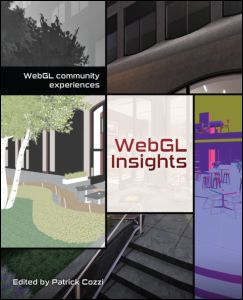

Most ebook files are in PDF format, so you can easily read them using various software such as Foxit Reader or directly on the Google Chrome browser.
Some ebook files are released by publishers in other formats such as .awz, .mobi, .epub, .fb2, etc. You may need to install specific software to read these formats on mobile/PC, such as Calibre.
Please read the tutorial at this link. https://ebooknice.com/page/post?id=faq
We offer FREE conversion to the popular formats you request; however, this may take some time. Therefore, right after payment, please email us, and we will try to provide the service as quickly as possible.
For some exceptional file formats or broken links (if any), please refrain from opening any disputes. Instead, email us first, and we will try to assist within a maximum of 6 hours.
EbookNice Team

Status:
Available4.6
37 reviews
ISBN 10: 0429158661
ISBN 13: 9780429158667
Author: Patrick Cozzi
Given its ubiquity, plugin-free deployment, and ease of development, the adoption of WebGL is on the rise. Skilled WebGL developers provide organizations with the ability to develop and implement efficient and robust solutions-creating a growing demand for skilled WebGL developers.WebGL Insights shares experience-backed lessons learned by the WebGL
1 ANGLE: A Desktop Foundation for WebGL
1.1 Introduction
1.2 Background
Figure 1.1 System architecture.
1.3 ANGLE Is Not an Emulator
1.4 ANGLE in WebGL App Development
1.4.1 Recommended Practices
Figure 1.2 Some line joint variations.
1.4.2 Beyond WebGL: Recommendations for OpenGL ES, WebGL 2, and More
1.5 Debugging (with) ANGLE
1.5.1 Debugging Translated Shaders
1.5.2 Building ANGLE Libraries
1.5.3 Debugging ANGLE with Chrome
1.6 Additional Resources
Bibliography
2 Mozilla's Implementation of WebGL
2.1 Introduction
2.2 DOM Bindings
Figure 2.1 Overview of Mozilla's WebGL implementation.
Figure 2.2 Mechanics of a WebGL method call.
2.3 WebGL Method Implementations and State Machine
2.4 Texture Uploads and Conversions
2.5 Null and Incomplete Textures
Table 2.1 Overhead of Texture Image Specification Calls
2.6 Shader Compilation
Figure 2.3 Shader compilation steps.
2.7 Validation and Preparation of drawArrays Calls
2.8 Validation of drawElements Calls
Figure 2.4 Example element array.
Figure 2.5 Complete binary tree storing partial maximums of elements.
Figure 2.6 Compact array storage of the complete binary tree.
2.9 The Swap-Chain and Compositing Process
Figure 2.7 Triple-buffered swap-chain.
2.10 Platform Differences
2.10.1 Mobile OpenGL ES Platforms
2.10.2 Desktop OpenGL Platforms
2.10.3 Windows
Figure 2.8 Shader compilation steps on Windows with the ANGLE renderer.
2.11 Extension Interactions
2.12 Closing Thoughts
3 Continuous Testing of Chrome's WebGL Implementation
3.1 Introduction
3.1.1 A Few Statistics
3.1.2 Background of Chromium's Test Setup
Figure 3.1 Chromium's waterfall view.
Figure 3.2 Chromium's Rietveld review tool, showing the trybot results from sending the patch through the commit queue.
3.2 Starting Points
3.2.1 Hardware and OS Configuration Changes
3.2.2 Test Harness Changes
3.2.3 Pixel Tests
3.3 Building Out the GPU Try Servers
3.3.1 Recipes
3.3.2 Builder/Tester Split
3.3.3 Isolates
3.3.4 Ramping Up the Try Servers
3.3.5 Analyzing CL Dependencies
3.4 Stamping Out Flakiness
3.4.1 Glib-Related Timeouts
3.4.2 Google Maps Timeouts
3.4.3 HTMLVideoElement and requestAnimationFrame Timeouts
3.4.4 Shutdown Timeouts on Windows
webgl insights
webgl bookcase
webgl y8
webgl info
unity webgl escape
Tags: Patrick Cozzi, WebGL, Insights